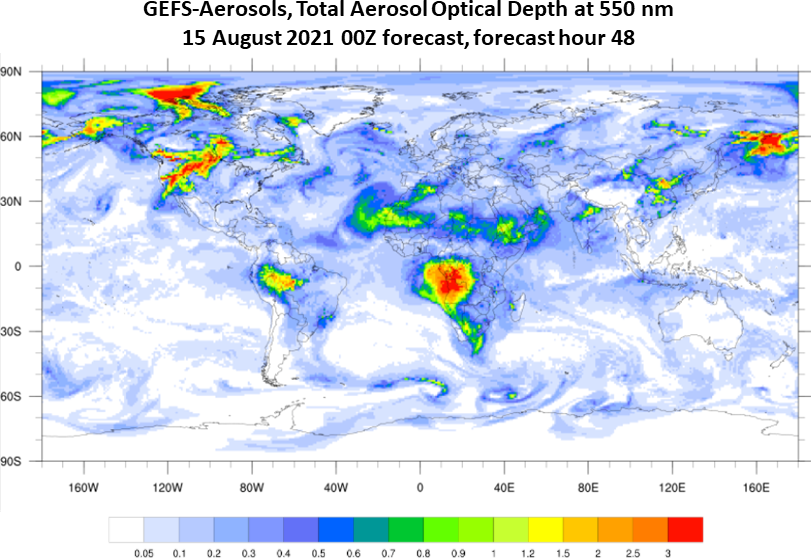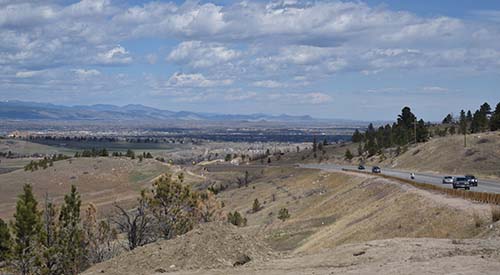A .gov website belongs to an official government organization in the United States.
A lock () or https:// means you've safely connected to the .gov website. Share sensitive information only on official, secure websites.
1 October 2021
The highest honor award granted by the Under Secretary of Commerce for Oceans and Atmosphere, the Department of Commerce Bronze Medal, recognizes federal employees for superior performance and is awarded to individuals, groups (or teams), and organizations.

CSL program lead Gregory Frost, with Georg Grell (GSL), Rick Saylor (GSL), Ivanka Stajner (NWS), Jeff McQueen (NWS), Jun Wang (NWS), and Shobha Kondragunta (NESDIS), receive a NOAA Bronze Medal for scientific achievement "for the development of the Global Ensemble Forecast System - Aerosols (GEFS-Aerosols) model to support air quality alerts and visibility forecasts."
This group is honored for developing GEFS-Aerosols, an atmospheric composition model that integrates weather and air quality forecasting to produce week-long forecasts of aerosol components including wildfire smoke, soot, organic carbon, particulate sulfate, dust, sea salt, and volcanic ash. This model transitioned into NOAA operations on 23 September 2020 and is the culmination of a successful 5-year collaborative effort between Oceanic and Atmospheric Research (OAR), the National Weather Service (NWS), and the National Environmental Satellite, Data, and Information Service (NESDIS) to bring together NOAA's atmospheric composition research and transition these innovations into operational forecasts.
A long-term goal of NOAA has been to develop an atmospheric composition model that integrates weather and air quality forecasting model research. Over 100,000 premature deaths occur annually in the U.S. due to exposure to elevated concentrations of air pollution and fine aerosol particles. GEFS-Aerosols forecasts will support local authorities and the public with timely warnings to make decisions to protect health.
NOAA is one of the first weather forecast centers to successfully implement any type of real-time forecasted aerosol into an already world-class operational numerical weather prediction model. GEFS-Aerosols significantly improves predictions of global aerosol composition and variability when compared with NOAA's previous global forecasts. The new model has reduced biases, improved correlations, and performs on par with other global aerosol forecasts.

CSL Director David Fahey, CSL program lead Gregory Frost, and CSL scientist Brian McDonald receive a NOAA Bronze Medal for organizational development "for expeditiously and skillfully coordinating research that leveraged the unique scientific opportunity resulting from the COVID-19 global pandemic." On the team are Ariel Stein (ARL), Jim Butler (GML), Jennifer Mahoney (GSL), Venkatachalam Ramaswamy (GFDL), Ken Mooney (CPO), Mitchell Goldberg (NESDIS), and Shobha Kondragunta (NESDIS).
This team is recognized for scientific advances from coordinated research to quantify the atmospheric impacts of the economic downturn resulting from the COVID-19 crisis and the gradual recovery. This was a collaborative effort across Oceanic and Atmospheric Research (OAR) and the National Environmental Satellite, Data, and Information Service (NESDIS). The team quickly prioritized the most impactful research opportunities. As a result of the team's innovation and creativity, NOAA was able to collect additional aircraft and surface observations. Those observations are being leveraged to explore the impacts on air quality and climate due to the economic slowdown caused by the COVID-19 pandemic.
When the COVID-19 pandemic completely disrupted our way of life, the economic slowdown reduced pollution from a wide variety of sources across different economic sectors and geographic regions. This situation presented an unprecedented opportunity for NOAA to assess changes in anthropogenic emissions, to quantify how atmospheric composition is changing in response, and to evaluate the consequent impacts on air quality, Earth's radiative balance, weather, and climate.
NOAA scientists investigated the impact of the decrease in economic activity in order to establish a "shutdown baseline" of emissions and track the recovery. The goal was to use those observations and data to improve weather, climate, and air quality forecasts. NOAA's measurements showed significant declines in ambient levels of key pollutants, consistent with satellite observations from NOAA and other agencies. NOAA's improved inventories incorporating these observations demonstrated declines in emissions associated with vehicle traffic and other human activity. These inventories are now driving model simulations to determine the air quality, weather and climate impacts associated with the economic slowdown.
The research teams receive their well-deserved recognition at the award ceremony held virtually on October 27 from NOAA Headquarters in Silver Spring, Maryland.